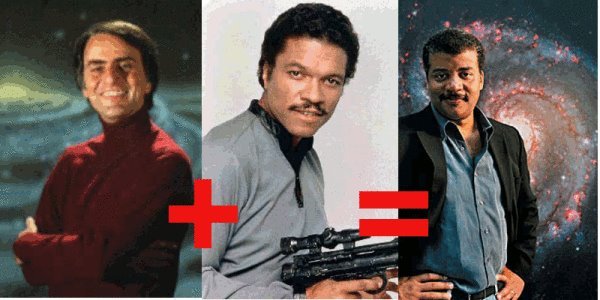In case you were wondering...
Sunday, March 9, 2014, at 9pm on FOX, the 13-part weekly TV series "Cosmos: A SpaceTime Odyssey" begins in the United States. Within seven days of this premiere, this first episode will have appeared in 181 countries, translated into 45 languages, via the National Geographic Network.
It's the continuation of Carl Sagan's landmark TV series from 1980, but brought into the 21st century. Cosmos is the story of how we came to find our place in the universe (not only where we are, but when we are) and why it matters to our civilization that we continue this searching for the truths of Nature.
The marketing plan for the series has been huge. In fact, it's the largest roll-out of a TV series of any kind in the history of television:
1) Cosmos is appearing not only on FOX, but this first episode will air simultaneously on ten of FOX's affiliate cable networks, including the National Geographic Channel, which FOX owns, and FOX Sports 1 & 2.
3) The series was promo'ed during the World Series this past October, and during the Super Bowl this past February.
4) Every major media outlet has written about the series - from the NYTImes, to USAToday, to TIME, to People, to GQ, to Parade, to The New Yorker. And the list goes on and on.
5) Major broadcast media also expressed huge interest.
So the expectations are high all around for the success of the Series. But more importantly, I think it serves as evidence that science has officially become mainstream.
Cosmos is appearing on FOX, which may at first seem like an unholy alliance. But I had became friends with Seth MacFarlane (best known as the writer and creator of the "Family Guy" animated series on FOX) at a 2008 kickoff meeting of the Science & Entertainment Exchange, which is a satellite branch in Los Angeles of the National Academy of Sciences. The office is conceived to explore any and all ways that science might encourage Hollywood to include science facts, themes, and characters in their portfolio of storytelling in television & film. Seth is a founding member of their Advisory Board. That's where I first learned of his deep interest in science, and more importantly, his deep interest in raising science literacy in the public. Upon learning that we were shopping Cosmos around to all the usual TV outlets for science documentaries, he suggested we bring the idea to FOX. They warmed to the Series, and, upon reviewing scenes and visualizations in progress, they steadily grew their marketing interest. Bringing us to today.
The series was written by the talented dyad of Ann Druyan and Steven Soter, who co-wrote the first two space shows of the newly rebuild Hayden Planetarium, after we opened the Rose Center for Earth and Space in 2000. They were also co-writers alongside Carl Sagan of the original series, so the new Cosmos carries the proper genetic legacy.
The Director is Brannon Braga, who has many film and TV credits, but is best known to his fan-base as a writer and director of the StarTrek Next Generation TV series.
The Director of Photography is Bill Pope, who is perhaps best known as the cinematographer of the Matrix trilogy and of Spiderman. So he's done interesting things with the camera. Combine this with a visual effect budget worthy of primetime network television and the story of the universe (and our place within it) comes alive as never before.
The musical composer for the series is Alan Silvestri, who scored all 13 episodes. He's done many films. But my two favorites among them are "Forrest Gump" and "Contact".
Another 700 people worked on this series in one way or another.
I serve as Host, Narrator, and Executive Editor.
I hope you get to see at least some of the series. It's conceived and designed to affect the viewer not only intellectually, but emotionally. And at its best, will reinvigorate the sense of wonder in us all.
As always, keep looking up.
-Neil deGrasse Tyson





